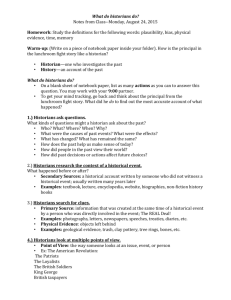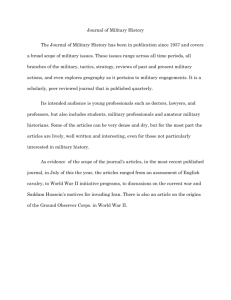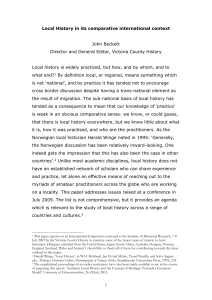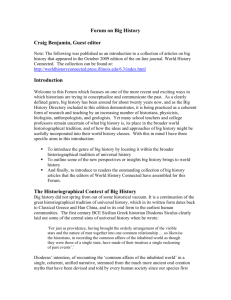WhyStudyHistory - History With Ms. Harding
advertisement
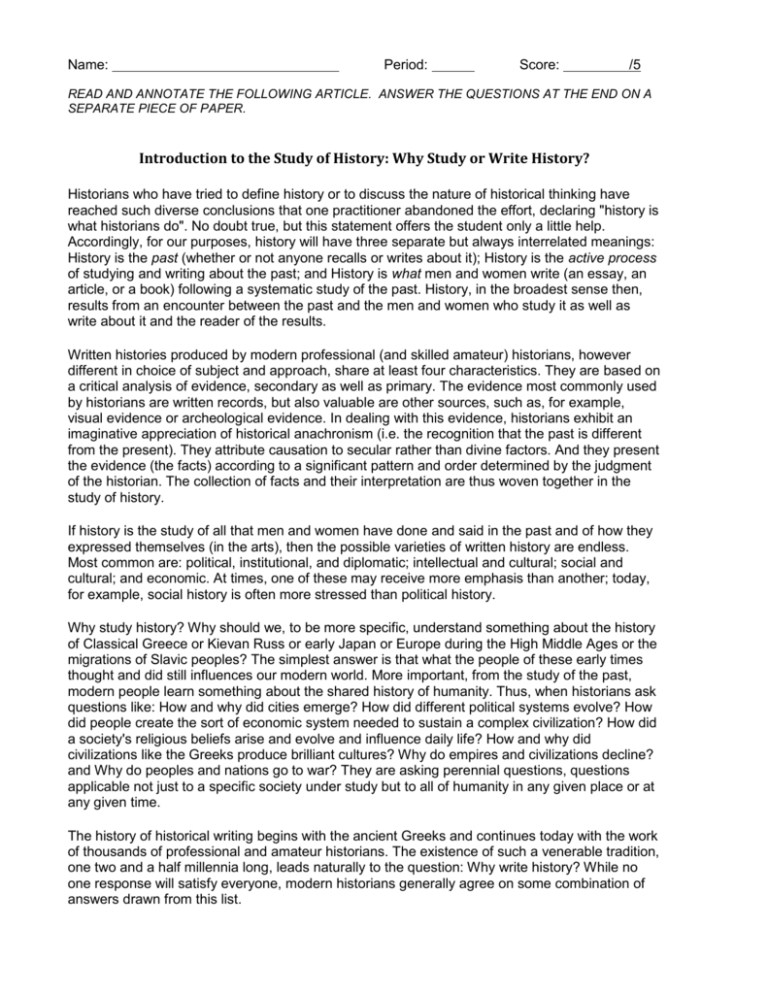
Name: Period: Score: /5 READ AND ANNOTATE THE FOLLOWING ARTICLE. ANSWER THE QUESTIONS AT THE END ON A SEPARATE PIECE OF PAPER. Introduction to the Study of History: Why Study or Write History? Historians who have tried to define history or to discuss the nature of historical thinking have reached such diverse conclusions that one practitioner abandoned the effort, declaring "history is what historians do". No doubt true, but this statement offers the student only a little help. Accordingly, for our purposes, history will have three separate but always interrelated meanings: History is the past (whether or not anyone recalls or writes about it); History is the active process of studying and writing about the past; and History is what men and women write (an essay, an article, or a book) following a systematic study of the past. History, in the broadest sense then, results from an encounter between the past and the men and women who study it as well as write about it and the reader of the results. Written histories produced by modern professional (and skilled amateur) historians, however different in choice of subject and approach, share at least four characteristics. They are based on a critical analysis of evidence, secondary as well as primary. The evidence most commonly used by historians are written records, but also valuable are other sources, such as, for example, visual evidence or archeological evidence. In dealing with this evidence, historians exhibit an imaginative appreciation of historical anachronism (i.e. the recognition that the past is different from the present). They attribute causation to secular rather than divine factors. And they present the evidence (the facts) according to a significant pattern and order determined by the judgment of the historian. The collection of facts and their interpretation are thus woven together in the study of history. If history is the study of all that men and women have done and said in the past and of how they expressed themselves (in the arts), then the possible varieties of written history are endless. Most common are: political, institutional, and diplomatic; intellectual and cultural; social and cultural; and economic. At times, one of these may receive more emphasis than another; today, for example, social history is often more stressed than political history. Why study history? Why should we, to be more specific, understand something about the history of Classical Greece or Kievan Russ or early Japan or Europe during the High Middle Ages or the migrations of Slavic peoples? The simplest answer is that what the people of these early times thought and did still influences our modern world. More important, from the study of the past, modern people learn something about the shared history of humanity. Thus, when historians ask questions like: How and why did cities emerge? How did different political systems evolve? How did people create the sort of economic system needed to sustain a complex civilization? How did a society's religious beliefs arise and evolve and influence daily life? How and why did civilizations like the Greeks produce brilliant cultures? Why do empires and civilizations decline? and Why do peoples and nations go to war? They are asking perennial questions, questions applicable not just to a specific society under study but to all of humanity in any given place or at any given time. The history of historical writing begins with the ancient Greeks and continues today with the work of thousands of professional and amateur historians. The existence of such a venerable tradition, one two and a half millennia long, leads naturally to the question: Why write history? While no one response will satisfy everyone, modern historians generally agree on some combination of answers drawn from this list. 1. Writing history preserves and celebrates the memory of great men and noble deeds, as Herodotus claimed in his History of the Persian Wars; 2. Writing history allows the judgment and punishment (vicarious) of the guilty, as, for example, in some histories of the Third Reich; 3. Writing history uncovers general truths (or laws) about human nature and behavior; both Thucydides (The Peloponnesian War) and Machiavelli (The Prince) believed in this conception of history, as apparently does Paul Kennedy, author of a recent book on the decline of empires; 4. Writing about history reveals lessons for the future; this idea prompted the philosopher George Santayana to exclaim, "Those who cannot remember the past are condemned to repeat it." 5. Writing about history helps you learn about yourself and helps in the creation of a personal and/or cultural identity. Each of us is a social creature, and that means we are at least partially the product of every experience we have had and of all that we have inherited from our families, our communities, our nation, and our spiritual, intellectual, and cultural heritage. Study of history allows you to situate yourself in time and place, and it helps you understand who you are and how you came to be; 6. Writing about history helps you expand your horizons, allowing you to understand the values, attitudes, and motives of other people, whether of different nationalities or racial groups or religious orientations. It opens entire worlds, both past and present, before you; 7. Writing about history is a creative act for the historian. In the act of writing history, the historian encounters the past and, using his or her imagination as well as established techniques of investigation, tries to understand and then recreate it; writing about history (or any topic) helps you master its subject matter, clarifies your understanding of it, and helps you understand your attitude toward it; 8. Writing about history (or any topic) teaches you how to locate, evaluate, synthesize, and present in an organized format large amounts of information; 9. Writing about history allows you to seek the truth (insofar as that is humanly possible) about a historical event or personage and add thereby to the sum total of human knowledge. essay by Prof. Robert W. Brown at The University of North Carolina PLEASE ANSWER THESE QUESTIONS ON A SEPARATE PIECE OF PAPER. 1. What are the three separate meanings of history? How are you as a student involved in the creation of history? 2. What are the four characteristics historians share in their study of history? 3. History can be studied from some of the following perspectives; political, institutional, and diplomatic; intellectual and cultural; social and cultural; and economic. Which would you choose to focus on and why? 4. Choose one question posed in paragraph 4 and explain how it relates to any issue happening today, either in the United States or the world. 5. Of the nine listed, which do you believe are the three most important reasons for studying history? For each reason, write a full paragraph explaining the value of that idea.





